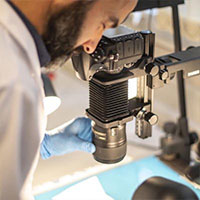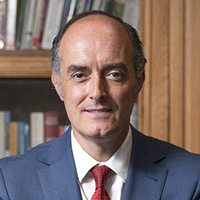Bachelor's Degree In Criminology and Forensic Sciences

Double training itinerary: Forensic Computer Science or Forensic Psychology
This innovative Bachelor's Degree in Criminology and Forensic Sciences responds to the growing public awareness for security and crime prevention.
We train future criminologists who must meet the main demands and needs of society, from regulatory advice on Criminal Policy, assistance and attention to victims, legal expert, conducting drills, intelligence work, resolving cybersecurity incidents, carrying out revitalization actions and safety initiatives in work environments, fire prevention, self-protection plans, crisis management, logistics control...
The Bachelor's Degree has two ambitious training itineraries:
- Forensic Computer Science:
Studies aimed at the techniques of analysis and preservation of evidence from a IT device, so that they can be taken into account by judges and courts. - Forensic Psychology:
Specific training for criminologists who want to apply the general principles of the branch of legal psychology to advising judges and courts.
Forensic Computer Science
Training is offered aimed at the techniques of analysis and preservation of evidence from an IT device, so that they can be taken into account by judges and courts. The most common and principal forensic traces are defined, malware analysis and identification of its author, specific processes to monitor the cyberenvironment and detect vulnerabilities, obtain information through ethical hacking techniques... The main objectives in said itinerary are:
Read +- Identify and obtain the evidence of a cybercrime with guarantees and respecting the chain of custody.
- Ensure the integrity and availability of a network infrastructure against any type of cyber-attack.
- Protect organizations from being victims of cybercrime again.
Forensic Psychology
This itinerary seeks to provide specific training to criminologists who want to apply the general principles of the branch of legal psychology to advising judges and courts. Participating, among other aspects, in the assessment of the cognitive and/or volitional capacities of the aggressor at the time of committing the criminal act, determining the veracity of the testimony, offering an assessment of the injuries and/or consequences of a criminal act, issuing reports on the grade progression in the penitentiary field, etc.
The main objectives set for this itinerary are:
- Understand the main biological, psychological and social foundations of human behavior.
- Carry out a diagnosis and evaluation of psychological disorders and their relationship with the criminal act.
- Provide the legal process with principles, techniques and psychological instruments that allow a more objective assessment of human behavior and help the judge to issue sentences that are more in line with the demands of the accused.
Nebrija University hosts Clue it
The inaugural simulation model of intelligence units, wherein participants evaluate their analytical skills, agility in response, and teamwork capabilities while addressing a genuine case devised by Lieutenant Colonel Manuel González.

We are Hackers League
4th Ethical Hacking League
We are Hackers League is a pre-university competition designed for 1st and 2nd-year baccalaureate students. It is open to students from any educational track who have an interest in exploring new technologies and their practical applications in both personal and professional contexts. The competition comprises two phases: an initial training phase where students learn the fundamentals of ethical hacking, as well as vulnerabilities in everyday computer systems. This is followed by a competition phase in which participants demonstrate their acquired knowledge and skills.
Faculty of academic and professional prestige
Curriculum
All our degrees and curricula have been prepared in accordance with the new guidelines established by current legislation, having already been verified by the National Agency for Quality Assessment.
The student must take 240 credits
First year 60 ECTS
First Semester 30 ECTS- 6 ECTS |Criminology I
- 6 ECTS | Introduction to Law
- 6 ECTS | Social Psychology
- 6 ECTS | Criminal Profiling
- 6 ECTS | Criminal Law I
Second Semester 30 ECTS- 6 ECTS | Criminalistics I
- 6 ECTS | Constitutional Law
- 6 ECTS | Criminology II
- 6 ECTS | Criminological interview and psychology of testimony
- 6 ECTS | Cybercrime and Cybersecurity
Second year 60 ECTS
First Semester 30 ECTS- 6 ECTS | Criminal Procedural Law
- 6 ECTS | Criminal Policy and Social Control
- 6 ECTS | Legal Psychology
- 6 ECTS | Criminalistics II
- 6 ECTS | Criminal Law II
Second Semester 30 ECTS- 6 ECTS | Victimology
- 6 ECTS | Terrorism and organized crime
- 6 ECTS | Juvenile Delinquency
- 6 ECTS | Sociology of Crime
- 6 ECTS | Forensic Medicine
Third year 60 ECTS
First Semester 30 ECTS- 6 ECTS | Public and private security policies. Collaboration and crime prevention
- 6 ECTS | Intelligence and Cyberintelligence
- 6 ECTS | Negotiation, mediation and alternative conflict resolution
- 6 ECTS | Elective I (of itinerary*)
- 6 ECTS | Elective II (of itinerary*)
Second Semester 30 ECTS- 6 ECTS | Applied Statistics
- 6 ECTS | Scientific police and Crime scene
- 6 ECTS | Forensic psychiatry
- 6 ECTS | Crime prevention and treatment
- 6 ECTS | Elective III (of itinerary*)
Fourth year 60 ECTS
First Semester 30 ECTS- 6 ECTS | Professional Academic Internship
- 6 ECTS | Professional deontology
- 6 ECTS | Elective IV (of itinerary*)
- 6 ECTS | Elective V (of itinerary*)
- 6 ECTS | Elective I (generic**)
Second Semester 30 ECTS- 6 ECTS | Final Research Project
- 6 ECTS | Economic and business crime
- 6 ECTS | Legal aspects of the expert opinion
- 6 ECTS | Elective VI (of itinerary*)
- 6 ECTS | Elective II (generic**)
Information of these subjects
Professors
 Adrián Nicolás Marchal González
Director del Departamento de Seguridad y Defensa
Adrián Nicolás Marchal González
Director del Departamento de Seguridad y DefensaDirector del Grado en Criminología y Ciencias forenses Director of the Department of Security and Defense
Director of the Bachelor's Degree In Criminology and Forensic Sciences
 Jorge Jiménez Serrano
Profesor
Professor
Jorge Jiménez Serrano
Profesor
Professor
 María Luisa Maroto López
Profesora
Professor
María Luisa Maroto López
Profesora
Professor
 Samuel Miralles Mosquera
Profesor
Professor
Samuel Miralles Mosquera
Profesor
Professor
 Christian Moreno
Profesor
Professor
Christian Moreno
Profesor
Professor
 Victoria Pascual Cortés
Profesora
Professor
Victoria Pascual Cortés
Profesora
Professor
More Academic Information
Official Degree:Bachelor's Degree in Criminology and Forensic Sciences
Center responsible:School of Law and International Relations
Available places: Classroom attendance 40 , 40 blended, 50 online
Type of Education: Classroom attendance, Blended and Online
Languages: Spanish
University Services: [+info]
Competences
- C1: Respond to the criminal phenomenon, applying the knowledge of criminal profiling, social control, prevention and criminal reaction, for the different contexts of criminal typology that are found in society.
- C2: Apply the technical conclusions of different reports to offer a specific solution to the prevention or reinsertion of crime, as well as the promotion of resilience mechanisms in victims.
- C3: Support and jointly apply their interdisciplinary knowledge in work teams, adapting to all kinds of threats.
- C4: Lead group work, integrating the joint knowledge of the entire group to end up offering a single response that integrates all the team members.
- C5: Disseminate and communicate effectively, among others, to recipients, professionals, institutional managers and the general population, the results obtained from their research.
- C6: Observe and apply the knowledge acquired in the Bachelor's Degree in real contexts, participating in work teams in the field of Criminology and Forensic Sciences.
- C7: Apply the knowledge acquired in the Bachelor's Degree for the development, presentation and defense of a project, in the area of Criminology and Forensic Sciences, that includes the competences acquired in the degree.
Online Study
Calendar and Schedules
Academic Calendar 24-25 First semester classroom attendance modality schedules Second semester classroom attendance modality schedules
Admission
For the purposes of pre-admission and admission, the evaluation of the candidate will be carried out on a scale from 0 to 10 points taking into account the following criteria and percentages:
- Academic record [60%]: The grades obtained by the candidate in their previous studies will be valued.
- Structured personal interview [30%]: The suitability of the candidate will be assessed by virtue of their experience, knowledge, technical and professional skills required to successfully take the intended studies. Their motivation and attitudes will also be assessed, as well as other personal aspects that contribute to their adequate adjustment to the chosen studies. The interview may be conducted in the language in which the studies are taught.
- Presentation document of the candidate [10%]: In a document prepared personally, the candidate will explain their motivation and interest in the requested studies, as well as any other personal circumstance that they consider relevant to the selection process.
Additionally, candidates must pass a specific competence test to determine the basic knowledge and minimum level that a candidate must have to be able to take the Bachelor's Degree, and it will assess whether the Director considers it so during the structured personal interview with the candidate.
In the event that the candidate's mother tongue is not Spanish, they must prove to have a B2 level of Spanish, through any accredited certificate.
Employability
Career Opportunities
Internships
Nebrija University maintains collaboration agreements with some of the best companies and institutions in the sector, for the Bachelor's Degree in Criminology and Forensic Sciences, among which stand out:- MINISTERIO DE DEFENSA
- MINISTERIO DE INTERIOR
- CONSEJO GENERAL DEL PODER JUDICIAL
- CITCO (Depende del Ministerio de Interior)
- ISID S.L
- SALESFORCE
- ACCENTURE S.L.
- MINISTERIO DE ASUNTOS EXTERIORES Y DE COOPERACIÓN
- SECRETARÍA GENERAL DE POLÍTICA DE DEFENSA (Depende del Ministerio de Defensa)
- DELOITTE LEGAL
- KPMG LEGAL
- IBM
- MEGA2 SEGURIDAD
- MINISTERIO DE ECONOMÍA
- PREVENT SECURITY SYSTEMS S.L.U
- ACK3
- PROSEGUR ALARMAS ESPAÑA S.A.
- ENTELGY INNOTEC SECURITY
- PwC
- Mapfre
- Indra Sistemas S.L.
- Globatika S.L.
- Eulen Seguridad
- High Strategies inteliigence
- S21SEC
- COMFICA Soluciones integrales
- Globalia Servicios coorporativos
- Grupo de análisis de Cuzco S.L.
- Iberdrola España S.L.
- Centros comerciales Carrefour S.L.
- Repsol S.A.
- Telefónica Ingeniería de Seguridad S.A.U.
- Ejército Nacional de Colombia
- Fundación internacional y para Iberoamérica de administración y políticas públicas F.S.P.
- Banco Santander
- Altran Innovación S.L.
- Winterman Madrid SLP
- DLTCODE S.L.
- BANKINTER
- EL CORTE INGLÉS S.A.
- Corporación Acciona Infraestructuras
- Everis Spain S.L.U.
- Asociación contra el Ciberacoso
- Global Technology 4 Elite S.L.
- Peritus Ciberseguridad S.L.
- Securitas Seguridad España S.A.
- Anti-Human Trafficking Intelligence Iniciative
- Ecix Group S.L.
- Valvonta S.L.
- Grupo de análisis Cuzco
- Dacor Intelligence
Employability recognized in the Rankings
The commitment of Nebrija University to the academic requirement, training in leading companies and institutions, innovation in multidisciplinary programs and international projection, places the University in the top positions of the most important rankings.
The International Ranking QS Stars awards Nebrija University the maximum score in the quality and satisfaction of students in teaching, employability of the graduates and the internationalization of the institution.
The national rankings also recognize Nebrija University as the first Spanish university in teaching and second in employability, highlighting its performance in research, knowledge transfer and internationalization.
The Bologna Declaration formalized the principles on which the European Higher Education Area should be based: quality, mobility, diversity, competitiveness and employment growth.
From this, Nebrija stands as an academic model of reference, educating students with excellent individual behavior, interaction with their environment and motivated by and for constant and continuous training. The Nebrija Institute of Professional Skills works every day to achieve the differentiation of our students through the development of attitudes and skills.
The main objective is for students to achieve the best of themselves through the development and empowerment of their personal skills and resources through personal self-knowledge.
In addition, some of the professional skills that are worked on within the three seminars are those related to interpersonal skills and active communication skills and negotiation, indispensable for our students to know how to transmit ideas, to argue them, to provide information and opinions in an adequate, clear and convincing way.
Within what will be their work performance, other aspects such as teamwork, conflict resolution and project management ability will be worked on.
In the third block, skills worked on are those aimed at increasing the student's employability. They will work with tools and techniques for job searching, and perform tasks that achieve in the student a greater use of their personal skills.
For all this we have currently active experts in selection of people, professionals dedicated to personal and professional training and professionals dedicated to the world of communication and the arts.
In this way, and in a complementary way to his/her specific training, we help the student create a differentiating pattern in the social and business environment in which he/she will be immersed when he/she finishes his/her studies.
International
The Department of International Programs at Nebrija University makes a constant effort to monitor the agreements with the most prestigious universities.
University Life in Criminology and Forensic Sciences
Visit all the Activities of the School of Law and International Relations
Opening ceremony of the academic year
Opening Ceremony of the academic year at Nebrija University's Madrid-Princesa Campus
Graduation Ceremonies | BACHELOR'S
Graduation of the academic year at Nebrija University's La Berzosa Campus
TEDxUNebrija. Alphas: the impregnable algorithm
Nebrija University organized a TEDx event for the third consecutive year, which took place at the Madrid-Princesa Campus, and was part of the year-long celebration of the 5th Centenary of Antonio de Nebrija. Under the title Alphas: the impregnable algorithm, TEDxUNebrija vindicated the validity of humanism in today's world and reflects on what is unique in human beings as a way of surviving the expansion of machines.
IMPULSA I. Nebrija Employment Conference
The 1st Edition of IMPULSA is born, the conference in which Nebrija talent and companies connect; it is organized by Nebrija Alumni and the Professional Careers department. From first-year students to former students, we will give you the keys to continue improving your professional growth.




